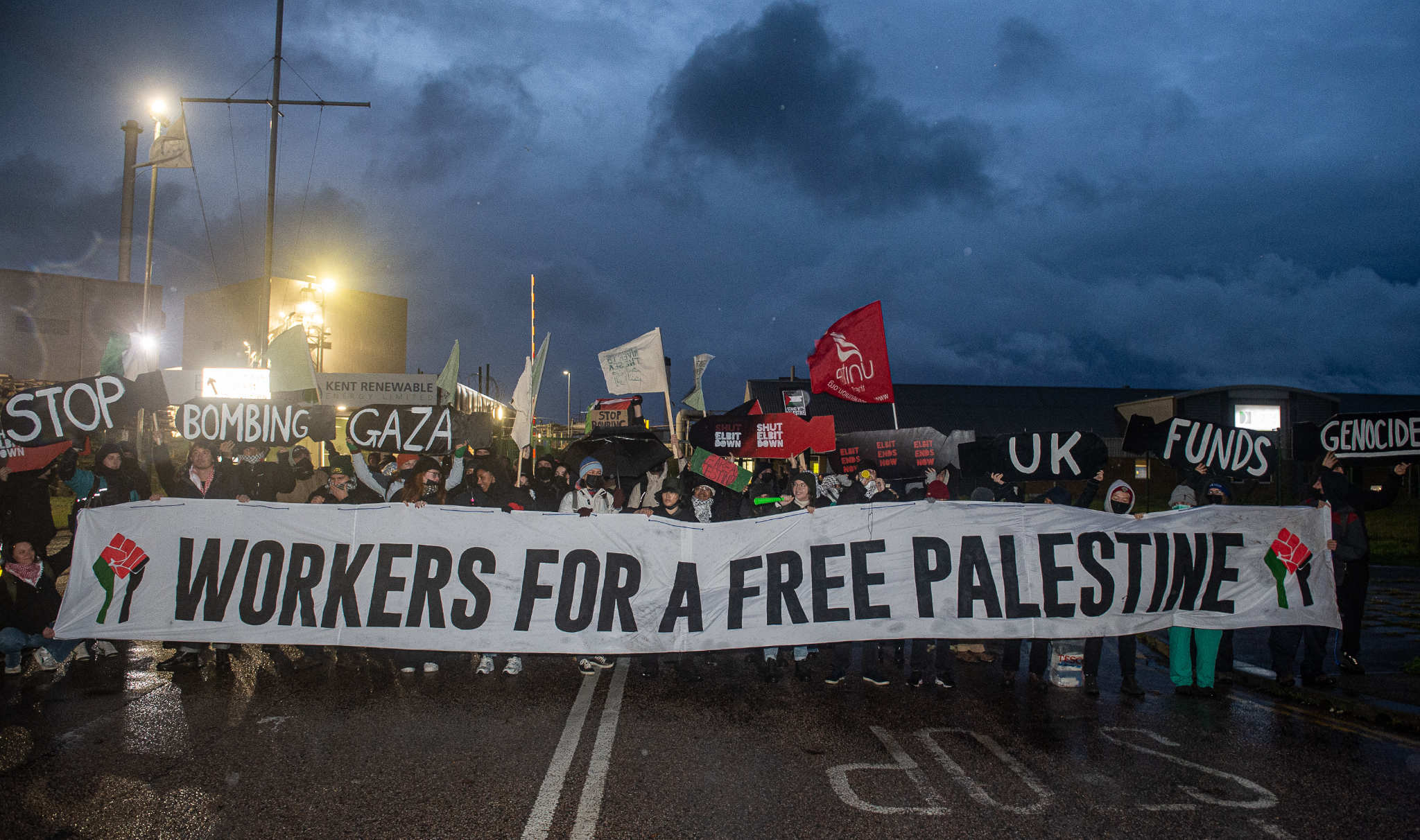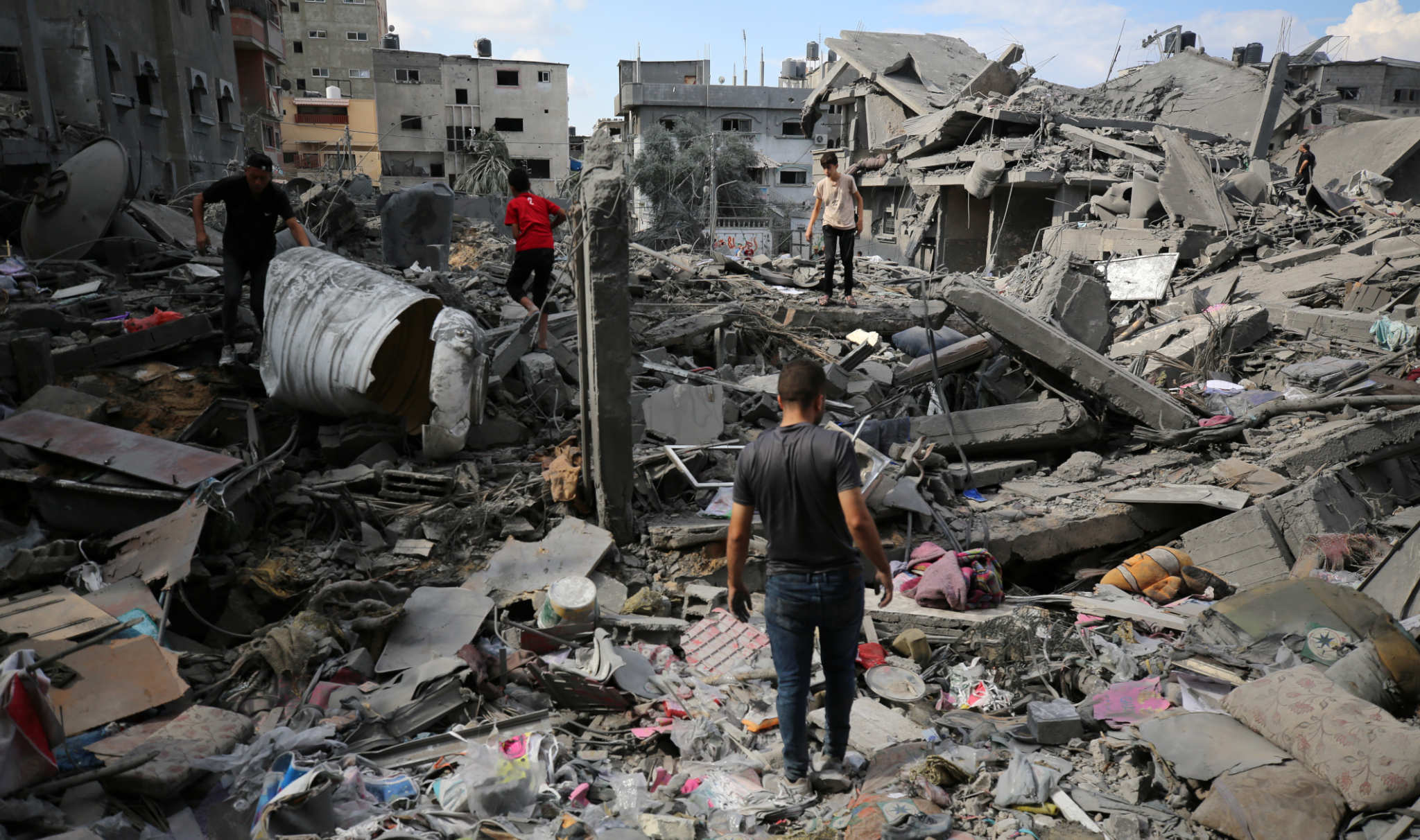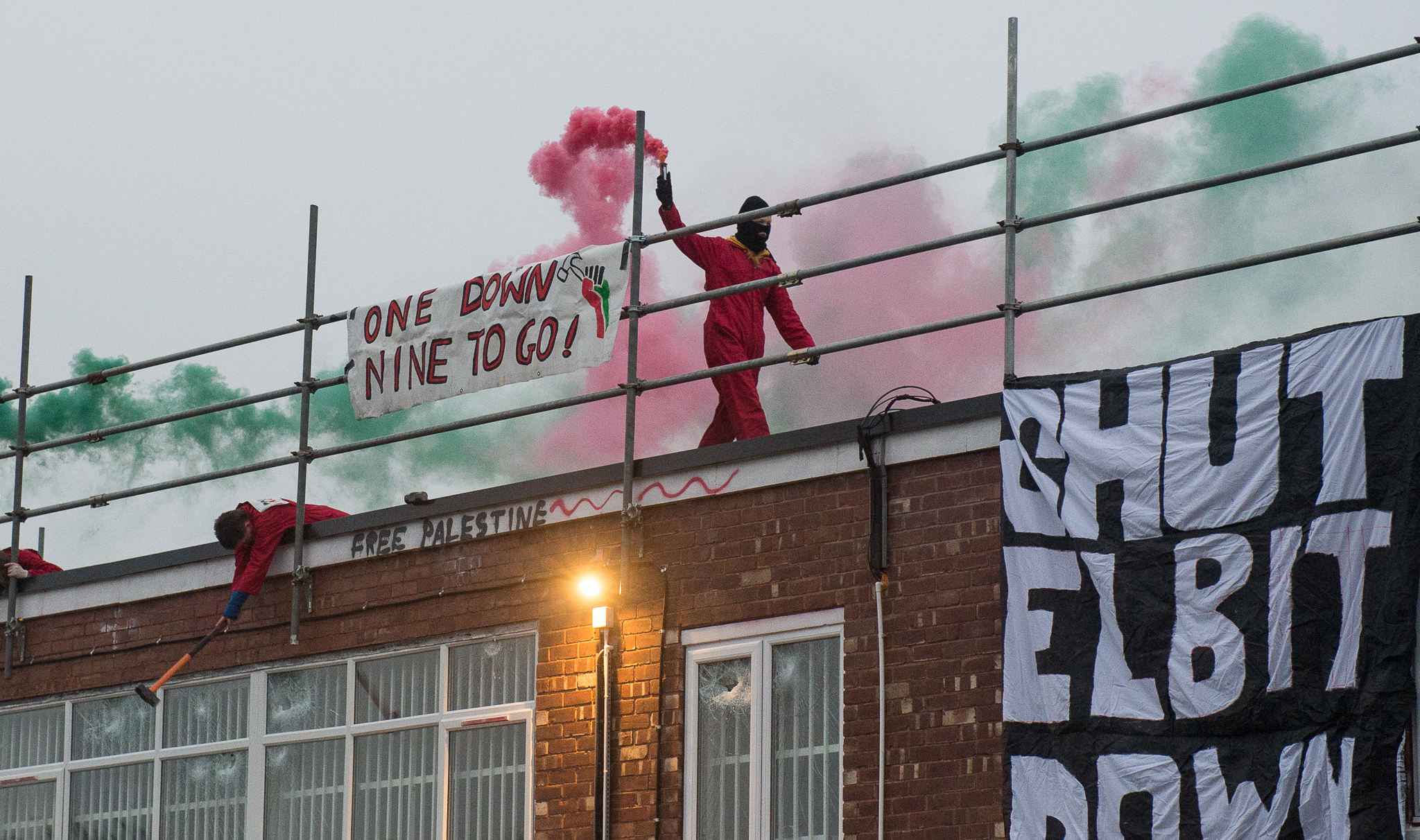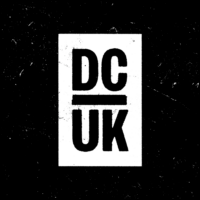UK arms sales are in the spotlight again because of the ferocity and genocidal intent of the Israeli assault on Palestinians and the reliance of Israeli forces on British military hardware.
While the USA is far and away Israel’s biggest and most important arms supplier and military-diplomatic advocate, the UK is also a leading military and political ally of Israel.
From the Balfour Declaration of 1917 to the recent failure of the British parliament to back a ceasefire, Westminster policy has had detrimental consequences for Palestinians across generations.
In this context, the call from Palestinian trade unions to people of conscience across the world to end the arms trade with Israel takes on an even more urgent resonance.
Two things are becoming increasingly visible in the current war: the highly internationalised character of arms production and trading; and the internationalisation of resistance to it.
The biggest US-headquartered arms companies – Lockheed Martin, Raytheon, Boeing, Northrop Grumman and General Dynamics – are all intimately involved in arming Israel. Since the start of the current war, their share value has increased by $24.7 billion.
All five companies have subsidiaries overseas, predominantly in western Europe. And major weapons systems are produced by increasingly international supply chains. More than 400 companies are involved in the supply chain for the F-35, for example – a fighter jet that the Israeli military is using in the air assault on Gaza and has used in previous assaults as well.
Companies in Britain
Of the companies in the F-35 supply chain, at least 79 are located in Britain. Information newly released by the Department for Business and Trade provided the names of all companies registered for the government licence that allows unlimited exports for the F-35.
These include very small firms such as Buoyancy Aerospace, who engage in the precision manufacturing of hard and soft metals such as aluminium, titanium and steel, as well as major internationalised UK companies such as BAE Systems and Rolls Royce, and UK subsidiaries of US companies such as Northrop Grumman, Honeywell and L3 Harris.
The UK is the only ‘Tier 1’ partner for the F-35 programme and has ordered 48 for the RAF, with more purchases planned. As such, 15 percent of the value of every F-35 is made in the UK, whoever the final recipient – including the 50 ordered by Israel, of which 36 had been delivered by the end of 2022.
“Of the companies in the F-35 supply chain, at least 79 are located in Britain”
The UK’s leading military goods manufacturer, BAE Systems, is the UK company most involved in the F-35, producing the components for 13 to 15 percent of the value of each plane, between the company’s US and UK operations.
BAE’s production sites in the UK are spread unevenly around the country: the rear fuselage of every F-35 fighter is made by BAE at Samlesbury Aerodrome in Lancashire.
The “active interceptor system” that the pilot uses to direct and maneuver the plane is made by BAE in Rochester, Kent. “Durability testing” for the F-35 is undertaken at the BAE structural testing facility in East Yorkshire.
Across the country
Many other British companies are also involved in the F-35 programme. Examples include Martin-Baker, which makes the ejector seats in Higher Denham, Buckinghamshire; Dunlop Aircraft Tyres, who make the aircraft tyres in Birmingham; and Cobham Mission Systems, in Wimborne, Dorset, who make the refuelling probe. (Cobham Mission Systems was sold to Eaton in 2021 and is now known as Mission Systems Wimborne Ltd.)
Leonardo – an Italian multinational with eight main sites across the UK – makes the laser targeting system for the F-35 in Edinburgh and Rolls-Royce makes the “LiftSystem” fan propulsion system for the F-35 in Filton, Bristol.
“The rear fuselage of every F-35 fighter is made by BAE at Samlesbury Aerodrome in Lancashire”
These are a combination of household names and smaller companies: all are involved in the international project of arms manufacture.
British-made equipment is also found in the F-16I fighters that are one of the mainstays of Israel’s air force bombing Gaza and have been so from 2003. BAE Systems provided components for the aircraft’s head-up displays (HUDs), which provide information to pilots as they fly.
There continues to be a steady stream of UK export licences for components for head-up/down displays to Israel, which are most likely spare parts for these F-16 HUDs. BAE’s plant at Rochester is also its manufacturing site for HUDs, and presumably for such components.
Taking to the streets
As the US and UK political establishments offer unbridled support for the Israeli war machine, hundreds of thousands of ordinary people have taken to the streets across the UK to voice their protest and demand a ceasefire.
A growing number are also taking direct action to do what the government is failing to do: shut down the production and transfer of weapons to Israel.
In response to a call from over 30 Palestinian trade unions and professional associations to end the international arming of Israel and complicity with its crimes against Palestinians, UK trade unionists, activists and campaigners have taken action at the sites of arms production and transfer.
The recent wave of action has seen hundreds of trade unionists block the entry to BAE Systems in Rochester, Kent and Instro Precision Systems, a subsidiary of Israeli arms company Elbit.
Activist group Palestine Action intervened against Leonardo in Edinburgh and at their London HQ as well as the Foreign Office on the 106th anniversary of the Balfour Declaration.
Union solidarity
There has been an upsurge in trade union solidarity in response to the Palestinian call. Members of the trade union Unite sent an open letter to its leadership and branches are passing motions in solidarity with Palestine.
Another union, Unison, supports the call for an immediate ceasefire and the RMT calls for an immediate end to hostilities on all sides and an end to the siege of Gaza.
The New Socialist is serving as a clearing house for intra- and cross-trade union solidarity. School and university students have walked out in protest against government and opposition support for Israel and against university partnerships with Israel.
“There has been an upsurge in trade union solidarity in response to the Palestinian call”
Beyond the UK, activists have disrupted the passage of a boat carrying military goods to Israel from Oakland and Tacoma in the US.
Activists in Missouri have perhaps taken the action most directly disruptive to Israeli military supply chains – blockading the Boeing factory that produces precision guided munitions used by the Israeli Air Force in Gaza.
Boeing is one of the companies most complicit in Israel’s genocidal assault, having exported at least $2.8bn in military goods from the US to Israel since 2000.
Factories and ports in Italy, Spain and Australia, as well as the UK, USA and Canada are being blockaded by trade unionists acting in chains of solidarity with Palestine. As the arms trade is an international project, so the resistance to it is international.





